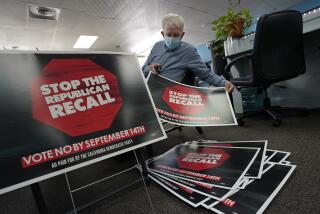Worst Punishment for Davis? Just Let Him Stay in Office
- Share via
The Lincoln Club of Orange County recently boosted the effort to recall Gov. Gray Davis. The organization of GOP donors pledged $100,000 and promised to raise another $150,000 from its well-heeled members. This announcement followed another large pledge from wealthy Rep. Darrell Issa (R-Vista).
Are these contributors making a smart investment? Or are we seeing the political equivalent of the dot-com bubble?
To start, consider the start-up costs. Organizers must gather 897,158 valid signatures by Sept. 2. And since many petition signatures turn out to be invalid, the effort actually needs more than 1 million.
Although the state’s fiscal crisis has brought Gov. Davis’ approval rating to historic lows, it may be tough to get that many Californians to sign on to a recall. As any political activist can tell you, volunteer signature drives tend to wilt in California’s summer sun. And commercial petition firms typically charge at least $1 per name, which means the campaign still must raise a lot of additional money.
To the extent that the effort relies on GOP contributors, it will divert resources that could go to other Republican campaigns. That’s what economists call the “opportunity cost.”
When the Field Poll asked voters if they would be willing to sign a recall petition, the nays had it, 62% to 33%. The recall campaign must therefore scrounge its signatures from just a third of the electorate.
Yet, despite the odds, the recall might just make the ballot. After all, the willing one-third account for more than 5 million voters. The petition drive should get a break from the swift victory in Iraq. If our forces were still slogging it out in Baghdad, the war would eclipse all other stories, making it impossible for the recall to draw serious attention.
Davis unwittingly helped the effort by exercising his legal right to add a response to the petition sheets. Maybe he thought it was a good defense to write that the state “is facing a budget deficit due to the bad national economy.” He forgot that would-be signers merely skim these statements. Take it from a teacher who has graded many a final exam: Skimmers seldom get the intended meaning. In this case, voters will see the phrases “budget deficit” and “bad economy” and blame Davis.
If Californians do get to vote on Davis, will the GOP come out ahead? Orange County Republicans have reason to feel good about the recall process. In 1995, outgoing Assembly Speaker Willie Brown struck a deal with Republican Doris Allen. She would succeed him as speaker and in return give Democrats a share of committee chairs and staff funds. The Orange County GOP then backed a recall effort that resulted in her replacement by Republican Scott Baugh. And in turn, Baugh’s election gave the GOP the thin working majority it needed to put Curt Pringle in the speaker’s chair (albeit briefly).
But California 2003 is not Orange County 1995. For one thing, Davis has better survival instincts than the late Allen. He can raise an enormous war chest and will work hard to demonize recall proponents. Already, his opposition researchers are digging out files on Issa.
And look for Davis to link the whole thing to Texas energy companies seeking revenge for his noble efforts on the energy crisis. Don’t laugh! He said much more audacious things in the 2002 campaign.
In a California recall election, voters simultaneously pick the official’s replacement in case the recall succeeds. In the 1995 Allen recall, Baugh could count on the district’s strong support for the GOP. But in 2003, a Davis recall would take place in a state that has been trending toward Democrats. All other things being equal, the whole effort could end up putting another Democrat in the governor’s chair -- and depriving the state GOP of one of its favorite demons.
Remember, though, that the replacement election is open to any candidate who pays the filing fee, and victory goes to the one who gets a plurality, however small. If Republicans unite around one major candidate while Democrats split among two or three, the GOP could win.
But there’s the rub. Winning the California governorship in 2003 is like winning an all-expenses-paid tour of the unfortunate country with the latest SARS outbreak. This past week, the Legislative Analyst’s office reported that the governor’s budgetary gimmicks will result in huge state deficits for years to come. The winner of a replacement election would thus have to seek further spending cuts or tax increases -- and do so in a sputtering state economy.
From the GOP’s standpoint, it might be a bad idea to put a Republican governor in that position. Maybe the harshest punishment for Davis is to let him stay in office.
More to Read
Get the L.A. Times Politics newsletter
Deeply reported insights into legislation, politics and policy from Sacramento, Washington and beyond. In your inbox twice per week.
You may occasionally receive promotional content from the Los Angeles Times.










